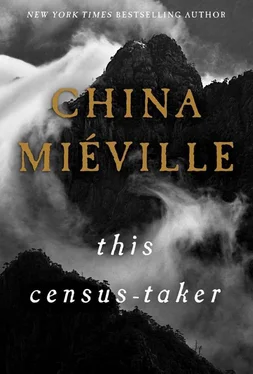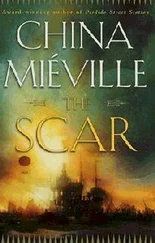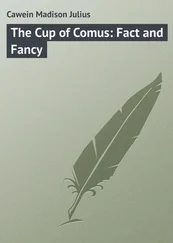I ran past them, holding my breath and not looking at them, up to the attic to hunker in my corner by the markings I’d made, to go exploring within them, keeping my gaze on them as the light diminished.
It was my father who came up at last to beckon me, to tell me it was time to eat. So I had to go back past him. I had to come down past him to where my mother sat at the table with her eyes half-closed and her head tilted back so she could look at me with a downward gaze no matter that I was standing. She watched me with a sullen coolness I now think was well-disguised concern.
It has no business being alive any more, but above me a cold-drunk wasp hovers about the chandelier’s glowing ring. An escort of shadow wasps disperses and converges on the ceiling in perfect formation as the summer insect falls and imprecisely rises. One bulb is broken so the shadows don’t surround the sluggish source-wasp but seem to flank it, to bring up its rear and suggest its way.
I can’t bring myself to kill it.
When I came to this room I moved the table to the window so I could write as I do now watching a city get dark and switch to neon. I’m an honored guest here, which is why there are two guards outside my door to take care of me, for when I do my work. That’s what my hosts said, with such courtesy and conviction that I wonder if they’ve come to believe it.
I’ve been working for many hours. I think those guards are probably lulled by the sounds in here. Which will continue.
There’s still a smell of smoke. I’m biding my time. While it was light I wrote a tiny poll of the absent: four behind me (I wrote “saw the sea; cut metal; stole a flouted order; twisted hooks on twine”), one perhaps also behind me, perhaps ahead — my predecessor. I burned the list.
This is my second book.
I started on my first book three years ago, in a distant country, and on my third book a year after that. Now at last it’s time for me to start writing this second book.
The manager of my line told me, You never put anything down except to be read. Every word ever written is written to be read and if some go unread that’s only chance, failure, they’re like grubs that die without changing. He said, You’ll keep three books.
So my first is a book of numbers. It’s lists and calculations and, for efficiency, I write it using ciphers. There’s a legend I never check any more, knowing all the signs now, the single-stroke shorthands that mean kilogram and tonne, widow, printer, generation, thief, the signs for currency, shipyard, doctor, for uncertainty, the holding sign that means there’s an unknown factor here to which I’ll come back. This first book’s for everyone, though almost no one wants it or would know how to read it.
The third of my three books is for me. You’ll keep one, is what he told me, for you alone to read, in which you should write secrets. But you’ll never be sure that no one else will read them: that’s the risk and that’s how the third book works.
When he gave me that warning he held his finger up as if he was counting to one.
He said, You’ll write it not because there’s no possibility it’ll be found but because it costs too much to not write it. If you ever find someone else’s third book, it’s up to you what you do. You could read it, but you don’t have to. Nothing you’d read would be for you. If I found one, he said, what I’d do is I’d set fire to it. I wouldn’t read it and I wouldn’t give it to you.
If I got back someone’s second book, well, I’d give you that, of course: the second book’s for readers, he said. But you can’t know when they’ll come, if they do. It’s the book for telling: no code for that one. But — he counted one again and had my close attention — you can still use it to tell secrets and send messages. Even so. You could say them right out, but you can hide them in the words too, in their letters, in the ordering on lines, the arrangements and rhythms. He said, The second book’s performance.
My third book is a notebook that fits in my hand. It’s a quarter full already, with my smallest writing, using symbols for my secrets.
The first book is a ledger that we share, my manager and I, recording as per our job. Sometimes we slip loose leafs between its pages, with amendments, information we need.
My second book is this box of papers.
You can tell it any way you want, he said, you can be I or he or she or we or they or you and you won’t be lying, though you might be telling two stories at once. Inherit a second book from someone else, to continue it, and you can have a conversation with what’s already there. Write on scraps and in its margins.
Yes, there are papers here from when this story was started, not by me.
Today we saw a big animal bigger than anything I ever seen, I read in the letters of someone very young, in this, my precocious precursor’s first language, that I’ve come to know better than my own first, certainly in writing, in some part from these words she left me. She writes, I am learning as we travel .
There are other pieces: the impressions of a serious child; scattered scenes, any narrative impossible to reconstruct; snips of description, a few of which have stayed with me since I learned to read them, and to which I still repeatedly return— There are raggedy people on the railway lines above; it has a snails eyes; in this country the water is thick .
Most of it was lost, my manager told me, before the remainder became mine. I’ve cross-referenced this book with the first, paged backward through the latter to find the statistics for what I think must be the town with thick water, or where there were people on lines overhead. I’ve wondered if we might return to any of those places, so I could double-check details and itemize them too, but that’s just what we shouldn’t need to do. Still there’ve been rare times when some feature where we stop has put me in mind of one of my predecessor’s phrases — a flint cupola invoking a building all cutty moonshaped gray, stilted longhouses reminding me dont fall theres things in the mud . As if my boss retraces steps sometimes, absentmindedly, or because tasks are unfinished, and we might one day come to the place with raised neglected rails where outcasts live.
Of the second book’s early pages that I have, the last-but-one-written — you can tell from the more formal older hand — is notes toward a catechism. I know because it’s labeled Notes toward my catechism .
It says The Hope, then that’s crossed out, and what hope was this? After that is written This Hate, which is crossed out too. Then starting again the words congregate in curious and precise lines, with a child’s care, for a reader to come:
The Hope Is So:
the catechism says, and then,
Count Entire Nation. Subsume Under Sets. -
Below that there’s a mess of scrawled, rejected, reworked, written and rewritten, arranged-just-so, and finally accepted lines.
This is all I have of the earlier story — scraps, notes, and the resulting catechism, finished in neat and left for me. That was the last page written and the first any reader sees. It was brought forward: it’s what opens the book.
I thought I understood it when I learned to read it: now, at last, perhaps I really do. If so, I have to decide what it’s my job to do. I’ll start with my own recitation, in answer at last, something important I’ve learned.
In
Keying, No Obstacle Withstands .
My second book comes fast, the noisiest of the three. I’m not writing it with a pen. My fingers quickstep on these keys and my second book rattles out.
Читать дальше












